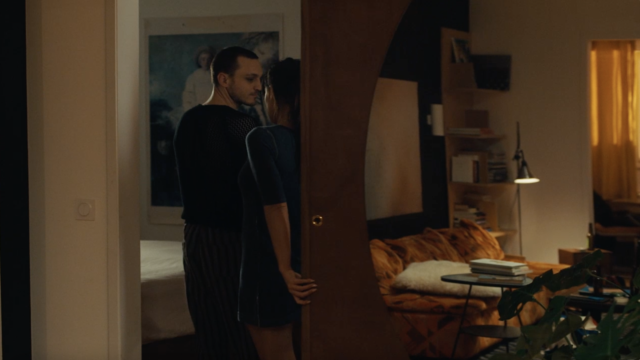Passages: The Bed Is There For You and Me, by Scott Nye

Desire is never ending, never fulfilled, and makes for a wonderful subject for fiction. Take Tomas (Franz Rogowski), a successful filmmaker living in Paris. He’s married to Martin (Ben Whishaw), a calm, patient, understanding man who has his own thriving, fulfilling career. They love each other, and they’re living well. As Tomas wraps his latest feature, partying with his crew, he meets Agathe (Adèle Exarchopoulos); they hit it off, sleep together, and Tomas finds a sexual fulfillment he did not expect. He excitedly tells Martin of this. Their conversation suggests some sort of understanding of these affairs, but also that Martin has grown weary of them, and before long, Tomas is packing his things and moving in with Agathe. But he still wants to own the vacation house with Martin. He still wants to visit Martin, who’s restarting his love life with a handsome author (Erwan Kepoa Falé), whenever he likes. He wants the best of everything and the worst of nothing.
Desire is also very easy to convey with a cast lead by these four, each of whom has a particular appeal, a magnetism that writer/director Ira Sachs’ increasingly-patient camera is eager to drink in. Rogowski, one of modern cinema’s best and most interesting actors, is an unlikely figure on paper to garner so much adoration, with his cleft lip and strange, thickly German voice. His persistent interest in and talent for playing romantic leads (Transit, Undine, In the Aisles, and Great Freedom precede this) has acted in defiance of how he might be otherwise typecast, his confidence as a performer vaulting ahead of our preconceived notion of what such protagonists should be like. Tomas is a romantic man, but only toward his own self-interests; like all narcissists, he doesn’t make this distinction. He assumes what’s good for him is good for all. And Rogowski’s open-heartedness, his ability to convey passion and complex yearning, makes plain why people like Martin and Agathe, despite their self-assuredness and hope for boundaries with him, so continually give into his inclinations.
Without overly lusting for his cast, Sachs and cinematographer Josée Deshaies collaborate closely with production designer Pascale Consigny and costume designer Khadija Zeggaï to create a tapestry of appeal. The camera doesn’t need to linger on their bodies (the nudity is less prevalent than its unrated/NC-17 designation might suggest, and the sex scenes are presented largely in simple, single takes), but this team coordinates their physicality, clothes, and environments to convey their beauty. The color coordination Sachs did so much with on his masterful, and wildly undervalued, Frankie, is further elaborated upon here. Rooms and sofas and robes and skin tones and the wild half-shirt that Tomas often wears are all a canvas onto which color can be laid. There are several shots that rest purely on Rogowski’s back that are incredibly suggestive and alluring, inviting the audience to embrace or reject him, dual reactions his character invites, often in tandem.
Among the crowd of cinephiles lusting for more sexually-explicit content in our too-prude world (yours truly among them), Passages has become a sort of beacon in the summer months, a hope for renewal. The film comes with a bit more of a poisoned tip than its advertising might suggest, a slightly tamer landscape than expected, and a considerably harsher worldview. Sex and desire are worthwhile emotions, incredibly thrilling experiences that the film does nothing to diminish, but when sought in absence of all else, will leave little else to be consummated. A short film, only 91 minutes, Passages burns through narrative faster than most can start to build theirs, and left me out of breath with anticipation and longing that I almost immediately restarted it. Sometimes the most unpleasant people are the most inviting.





























